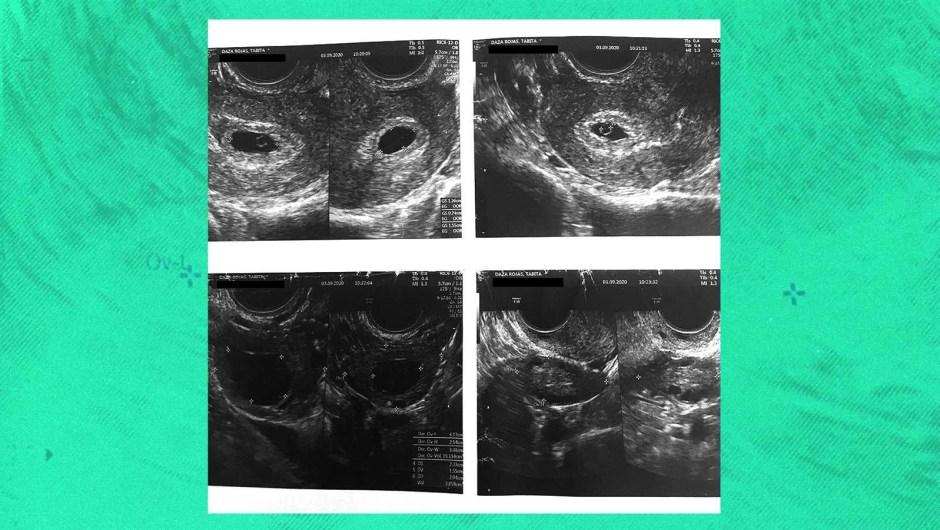Santiago, Chile (CNN) -
In
Chile's
arid Atacama Desert, Tabita Daza Rojas is trying to raise enough money to finish the construction of her house before her baby arrives, who will be born any minute.
Eight hundred kilometers to the south, in La Pintana, a suburb of the capital Santiago, Cynthia González is breastfeeding her 2-month-old son.
But you need to buy milk to supplement your body's supply and you are concerned about how you can afford it.
Rojas and González come from different backgrounds, have different lives and ambitions.
Yet they, and at least 170 other women at the time of writing, share a common reality: they all claim to have become pregnant while taking Anulette CD, an oral contraceptive pill made by Silesia, a subsidiary of the German pharmaceutical company Grünenthal. .
Without the option to legally terminate their pregnancies, if they wanted, or any real responsibility from the government or pharmaceutical companies, the women, represented by the Chilean sexual and reproductive rights group Corporación Miles, prepare to file a legal action in court. civilians.
In a region where barriers to women's reproductive rights are the norm, CNN has identified a government health agency that is quick to blame these women, as well as a history of poor production quality and related prior problems. with oral contraceptives at the Chilean factory in Grünenthal, their gateway to Latin America.
advertising
The history of Tabita Rojas
In March 2020, after discovering an ovarian cyst, her doctor was concerned that it might have been caused by her birth control implant, so he recommended that she take the pill instead, and prescribed Anulette CD.
Rojas didn't think much about the change;
she had taken oral contraceptives before and agreed that they made sense for her health.
Also, after giving up her place in a forensic criminology program at 17 because she had become pregnant, now 29 she was excited again about her future.
"I had to put all that aside and dedicate myself to my son," said Rojas, who had a second child two years later and supports her family by doing seasonal work at a grape packing plant.
However, in early 2020, things were changing.
Her children, boys now 11 and 9, both with learning difficulties, were more independent and spent more time with their father.
As part of a government development in his hometown Copiapó, Rojas had been given a small piece of land to build a house.
She had been saving money and planned to move out of the house that she and her children had been sharing with three other family members.
And she was in love.
At the beginning of the relationship, Rojas and her boyfriend had decided not to have children together.
"It would be impossible to support someone else," he said.
But in September 2020, just five months after Rojas started taking Anulette CD, she found out that she was pregnant again.
He would later learn, after seeing it posted on Facebook, that his tablets were from a batch that had been recalled the previous month by Chile's public health authority, the Chilean Public Health Institute (ISP).
"I was about to finish the second [box of three that had been prescribed] when I found out about the problem," he said.
By then she was six weeks pregnant.
1 of 3
|
On February 21, 2021, the Chilean Health authorities wrote a response to Tabita Rojas regarding her questions about the controversy over the Anulette CD contraceptive pills (right page).
On the left you can see the ISP alert from August 24, 2020 announcing the recall of the first defective batch of pills.
(Source: Tabita Rojas / ISP)
2 of 3
|
Rojas' neonatal ultrasound image in September 2020 revealed that she was 6 weeks pregnant.
(Source: Tabita Rojas)
3 of 3
|
The packets of Anulette CD birth control pills that Rojas took for three months before learning that they had been recalled in August 2020. (Source: Tabita Rojas)
'I was never happy with this pregnancy'
The details may differ, but similar scenarios have been unfolding throughout Chile.
González, a mother of four, who had been on Anulette CD for eight months, became pregnant for the fifth time in May 2020.
She tells CNN that she took her contraceptive "religiously every morning," before adding, "Because women set an alarm for those kinds of pills."
The news devastated her.
His personal life was complicated and his finances extremely limited after losing the market stall where he sold second-hand clothes.
"I was never happy with this pregnancy," González said.
“If you only knew all the nights that I spent crying thinking I didn't want [to have the baby].
I had no options.
Alluding to the strict abortion laws of Chile that prohibit a woman from interrupting a pregnancy except for three reasons (if the pregnancy is the result of rape, if the fetus is incompatible with life outside the womb, or if the life of the woman is at risk), González spoke about her discomfort and how she tried to hide her growing belly.
“I hid the pregnancy for a long time, so they wouldn't ask me: 'Hey, another child, and whose is it, because you're no longer with your husband,' and have to explain that we were separated.
It was already a complicated situation for me, and much more to have to tell everyone.
Anulette CD is a 28-day combined oral contraceptive, one of the most common forms of birth control.
It contains synthetic versions of the hormones estrogen and progesterone, which are produced naturally by the ovaries.
Hormones work to prevent ovulation, which means that the ovaries do not release eggs, and they also thicken the lining of the cervix to make it more difficult for sperm to pass.
The pill also makes the lining of the uterus thinner, so that if an egg is fertilized, it cannot implant and begin to grow.
Pill regimens generally involve taking 21 "active" pills containing the hormones and seven "non-active" or "placebo" pills, to maintain a daily routine, during which a person bleeds.
The first batch, 139,160 Anulette CD pill packs, according to its manufacturer, was recalled on August 24, 2020 after healthcare workers at a rural health clinic complained that they had identified 6 defective pill packs. .
In them, according to information from the ISP, the placebo (a blue pill) had been found where the active pills should have been (a yellow pill), and vice versa.
In its online notice, posted Aug. 29, the ISP said that the makers of Anulette CD, a company called Laboratorios Silesia SA (Silesia), had been informed and were recalling the faulty batch.
The ISP then advised the health centers to quarantine any packages they had of the affected batches.
Then, a tweet was sent from the ISP account alerting his followers about the withdrawal.
But without a national campaign to inform the public more directly, the recall went unnoticed.
One week after the first recall, on September 3, the same error was detected in 6 packages from a different lot at a clinic in Santiago.
Here, tablets were also missing, but others were crushed, according to the ISP.
By the time the problems were pointed out, Silesia said it had already distributed 137,730 packages to health centers.
This time, the ISP said it would suspend Silesia's registration until the lab could improve its quality and production processes.
But it was too little, and too late.
In total, according to the manufacturer's own accounts, 276,890 packages of Anulette CD from the two defective batches, all with an expiration date of January 2022, had been distributed to family planning centers throughout Chile.
Surprisingly, on September 8, less than a week after Silesia's suspension, the ISP issued another document reversing its earlier decision.
In the memorandum, which was posted on its website, the health authority said that Anulette CD could be redistributed.
He stated that packaging flaws could be easily detected and transferred the responsibility for doing so and informing users of the service to healthcare workers.
The Health Ministry told CNN in an emailed statement that they informed the public health service "to inform users of this situation and take appropriate action," and said they provided support and advice to health workers. to support "women who may have been affected by contraceptive quality problems."
But Rojas said her local clinic only informed her about the faulty pills after she went for a prenatal checkup.
And Rodríguez told CNN that no one has contacted her.
ISP Director Heriberto Garcia defended the decision to put Anulette CD back on the market, saying in a video interview with CNN: "Just because [a package] belongs to the lot doesn't mean it's bad."
So it was left to Chilean civil society to raise the alarm.
Sexual and reproductive rights group Miles ran a social media campaign and used their networks to spread the word.
"It was after [posting to Instagram] that we started getting emails from people saying they were already pregnant because they were using Anulette," said Miles' legal coordinator Laura Dragnic.
By October 2020, some 40 women had contacted.
According to Miles, after multiple appearances by his staff in local media, another 70 women came forward.
The number now stands at 170, but Dragnic expects it to grow as rural women or those without access to the Internet or television have yet to be reached.
"We hope that there will be many more women with this problem," he said, "especially since the state has not attributed any responsibility and made no statements or serious commitments [to the abortion rules] for the women affected."
Seven days after Dragnic spoke to CNN, and six months after the first recall, health authorities announced that the makers of Anulette CD had been charged a series of fines totaling approximately 66.5 million pesos. Chileans (approximately US $ 92,000).
Miles and his partners are calling on the government to pay financial reparations to affected women and provide access to safe and legal abortions for those who wish to terminate their pregnancy.
Multiple retreats at the Grünenthal factory in Santiago
Grünenthal, whose Santiago factory Anulette CD is manufactured, began operations in Chile in 1979. The privately-owned German pharmaceutical company, which reported a profit of € 340 million (US $ 405 million) in the 2019-2020 fiscal year, is best known for its product Tramadol, an opioid pain reliever, classified as a controlled substance in many countries.
In 2017, the company increased its investments in Chile by opening what it called "the most modern women's health products plant in Latin America," a $ 14.5 million facility.
Although it is only a small part of Grünenthal's portfolio, the investment was enough to place it among "the three largest pharmaceutical companies in Chile."
But CNN has found that the production problems started shortly after the factory opened and have affected a variety of oral contraceptives marketed not only by Silesia SA, but also by Grünenthal's other Chilean subsidiary, Andrómaco.
In 2018, Tinelle, a contraceptive pill from Silesia's portfolio, was voluntarily withdrawn from the market after a decision to change the sequence of the active and placebo tablets (keeping the same number of each but placing them in a different order) than Grünenthal spokesman Florian Dieckmann admitted "confused [patients] about the new sequence of pills."
Dieckmann said the pills were put back on the market after Silesia "further clarified the foil instructions on how to follow the correct sequence of tablets."
Two more oral contraceptives, Minigest 15 and 20, manufactured by Andrómaco at the Chilean plant in Grünenthal, were recalled in October 2020 after the public health authority, the ISP, said that during stability tests it was found that they contained an insufficient amount of the active ingredient: hormones.
The Grunenthal spokesperson said that, at the time of packaging, the tablets had "the correct amount of active ingredient", adding that "the tablets are exposed to excessive temperatures and humidity throughout the shelf life of the product under laboratory conditions." and that it is "it is unlikely that tablets will be exposed to these conditions for long in real world circumstances."
Based on a Freedom of Information request from Miles, which CNN later followed, the Anulette CD production has had the most trouble, according to the ISP's own records.
Between August 6 and November 18, 2020, health clinics in Chile reported a wide range of problems with the pills, including small holes found in the tablets;
pills that had orange and black spots;
wet and crushed tablets;
and containers that did not release all of the pill effectively, leaving traces of the pill stuck inside.
In total, the ISP received 26 different complaints about 15 different lots of Anulette CD pills, but only 2 lots were recalled.
"It is important to clarify that not all complaints about products end in recalls," explained the ISP.
"Those that are recalled ... are those in which critical defects are detected and this was the case with the recalled batches."
Aside from posting details of previous recalls on its website, the ISP reportedly did little else to notify women, and despite its apparent challenges, Grünenthal remains the Chilean government's main supplier of oral contraceptives.
According to the ISP, 382,871 women are prescribed Anulette CD, and between May 2019 and January 2020, Grünenthal made at least $ 2.2 million in contracts that CNN has seen.
The Health Ministry did not respond to written questions from CNN and declined an invitation to be interviewed.
The blame game
While no one denies the production problems, Grünenthal, its Chilean subsidiaries, and government officials seem determined to shift some of the blame for the defective pill packages to others.
Dieckmann explained that the company discovered that the problems were due to a problem on the production line that caused some tablets to move during the packaging process.
That led to some packages with "empty cavities, some lost tablets or crushed tablets," he said, but emphasized that the effectiveness of the contraceptive had not been compromised.
The spokesperson also noted that combined oral contraceptives are not 100% effective.
According to the World Health Organization, the combined oral contraceptive pill each year results in less than 1 pregnancy in 100, "with consistent and correct use."
"So I think it's an important background, right?" Dieckmann said, noting that those statistics increase when the pill is not taken consistently or correctly.
"I'm not trying to say it's the woman's fault," Dieckmann said, before adding that correct and consistent use was a "factor that I think we have to consider here."
"Women say, 'I was taking the pill, and I still got pregnant, why?'
That's what happened, "he said, referring to the statistics.
Grünenthal's spokesperson told CNN that the company was unable to discuss their individual cases, as none of the affected women had contacted the company directly.
Addressing the controversy over the Chilean public broadcaster in December 2020, Silesia's medical director Leonardo Lourtau said that in addition to the company being responsible for visually checking the packaging, health officials should have done so as well, and “obviously , the people who take the medicine too ».
And the ISP's Garcia suggested it was important to look at how the effectiveness of birth control might change as the body interacts with other products, such as antibiotics, tobacco, or alcohol.
"I'm not saying that I have had a lot of alcohol or that I am a smoker, but I am giving you the background."
Despite Garcia's claims, most reproductive health experts widely agree that there is no evidence to suggest that smoking decreases the effectiveness of the pill;
that alcohol will only do so if a person vomits shortly after drinking it;
and that only one type of antibiotic, those based on rifampicin, can affect oral contraceptives.
'Systematic failures'
Drug recalls are not unusual, but it is difficult for those campaigning for women not to perceive an injustice here: Grünenthal continues to view his factory as the key to reaching 168 million women in Latin America, while women who take their products have to remain vigilant or risk becoming pregnant.
The risk is increased, reproductive rights groups say, by the fact that these women, who are already poor and marginalized, cannot count on strong government support should the unwanted occur.
Paula Avila Guillén, executive director of the New York Women's Equality Center, a nonprofit organization that defends and monitors reproductive rights in Latin America, told CNN that if the recall were bad meat, the entire country would have known about it. immediately, and the product would have been immediately withdrawn from the market.
"But when it comes to women and reproductive health, they just don't care," she lamented.
And so, Miles and his partners, writing to the Inter-American Commission on Human Rights and the United Nations, have described the situation as "a clear situation of systematic discrimination against women."
Meanwhile, back in Copiapó, at 37 weeks pregnant, Rojas has already accepted her fate.
Once again she will have to put aside her dreams for the future of her son, another baby.
They will call him Fernando.
Illustrations and graphics by Gabrielle Smith of CNN





/cloudfront-eu-central-1.images.arcpublishing.com/prisa/LSI5G6FGBZCT5GWRU4GZQ5RLTA.png)









